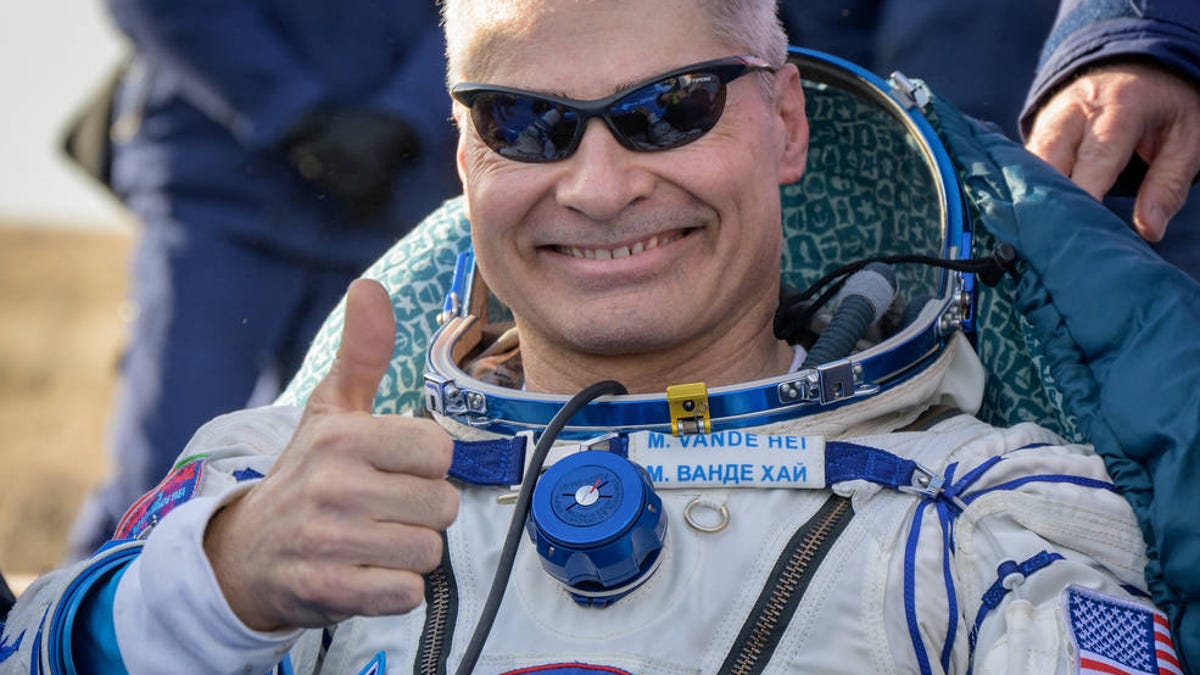Russian Capsule Brings Record-Setting NASA Astronaut Back to Earth
As the Ukraine war rages on, Russia's space agency has made bizarre threats about its cooperation on the International Space Station.

NASA astronaut Mark Vande Hei is seen outside the Soyuz MS-19 spacecraft after he landed with Russian cosmonauts Anton Shkaplerov and Pyotr Dubrov in a remote area near the town of Zhezkazgan, Kazakhstan, on Wednesday, March 30.
Despite the highest geopolitical tension between Russia and the United States in a generation, an American astronaut joined two Russian cosmonauts aboard a Russian Soyuz spacecraft to return from the International Space Station to a safe landing in Kazakhstan on Wednesday.
NASA's Mark Vande Hei set an American record for the most time away from Earth in a single trip, spending 355 days in space. That's the same duration cosmonaut Pyotr Dubrov spent on the station, having launched with Vande Hei last April on a different Soyuz. Soyuz commander Anton Shkaplerov joined Vande Hei and Dubrov for the trip back to the surface, landing at 4:28 a.m. PT.
The full trip from orbit to Earth took a little over four hours, ending with a parachute-assisted landing on the Kazakh steppe. NASA personnel greeted Vande Hei after landing to check the astronaut's vitals, and he will make the trip home to the US on a NASA aircraft.
The routine return comes amid Russia's military invasion of Ukraine and weeks of tension between the Kremlin and Washington. Earlier this month, the head of Russian space agency Roscosmos, Dmitry Rogozin, began making bizarre threats about the two nations' collaboration on the ISS. A Russian state-controlled media outlet posted a video that appeared to show cosmonauts waving goodbye to Vande Hei on the station before the Russian segment of the ISS was seen separating and going its own way in orbit.
Russian gov't-controlled RIA Novosti @rianru posted a video on Telegram made by @Roscosmos where cosmonauts say goodbye to Mark Vande Hei on #ISS, depart, and then the Russian segment detaches from the rest of ISS. @Rogozin is clearly threatening the ISS program. #NASA #Ukraine pic.twitter.com/fj2coK1xR1
— NASA Watch (@NASAWatch) March 5, 2022
Since the beginning of the war in February, however, NASA officials have insisted that everything remains normal for all participants in the ISS program.
In the end, everyone made it back to Earth with smiling faces and no incident.
Vande Hei's mission eclipsed the NASA record set by astronaut Scott Kelly, who spent 340 days in space in one go.
There are now three astronauts from NASA, one from the European Space Agency and three Russian cosmonauts on the ISS. Three more NASA astronauts and one from the ESA are set to arrive in late April, riding aboard a SpaceX Crew Dragon.

